VW Touran VS Toyota C-HR – Specs, Efficiency & Price Comparison
Which model is the better choice – the VW Touran or the Toyota C-HR? We compare performance (150 HP vs 223 HP), boot capacity (834 L vs 447 L), efficiency (5.30 L vs 0.80 L), and of course, the price (34700 £ vs 29100 £).
Find out now which car fits your needs better!
The VW Touran (MPV) is powered by a Petrol or Diesel engine and comes with a Manuel or Automatic transmission. In comparison, the Toyota C-HR (SUV) features a Full Hybrid or Plugin Hybrid engine and a Automatic gearbox.
When it comes to boot capacity, the VW Touran offers 834 L, while the Toyota C-HR provides 447 L – depending on what matters most to you. If you’re looking for more power, you’ll need to decide whether the 150 HP of the VW Touran or the 223 HP of the Toyota C-HR suits your needs better.
There are also differences in efficiency: 5.30 L vs 0.80 L. In terms of price, the VW Touran starts at 34700 £, while the Toyota C-HR is available from 29100 £.
Compare all the key specs now and find out which model fits your lifestyle best!
VW Touran
The VW Touran stands out as a versatile and reliable choice for family transportation. Its spacious interior and cleverly designed seating arrangements offer exceptional comfort and practicality for both short trips and long journeys. With a focus on safety and an array of advanced features, the Touran delivers a driving experience that combines convenience with peace of mind.
details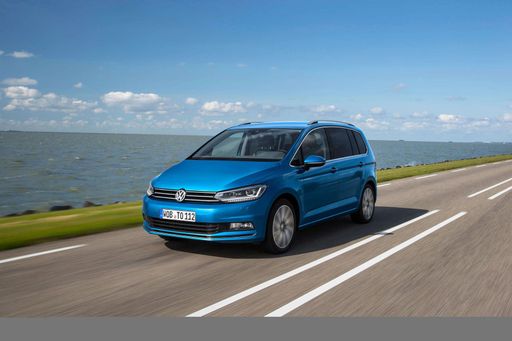 @ volkswagen-newsroom.com
@ volkswagen-newsroom.com
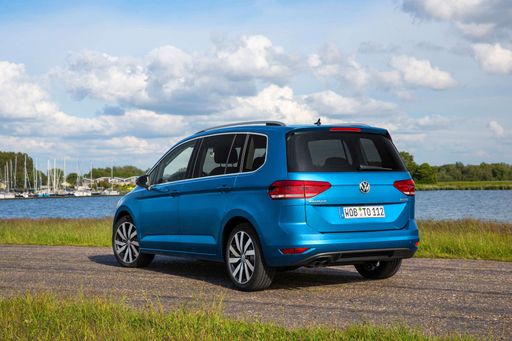 @ volkswagen-newsroom.com
@ volkswagen-newsroom.com
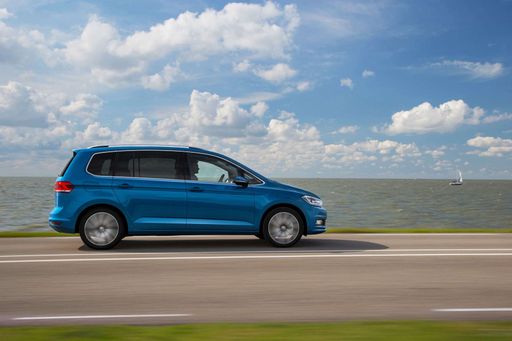 @ volkswagen-newsroom.com
@ volkswagen-newsroom.com
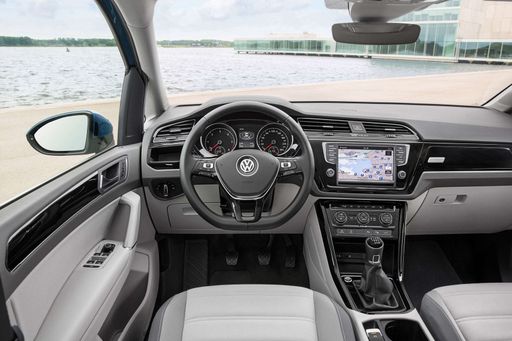 @ volkswagen-newsroom.com
@ volkswagen-newsroom.com
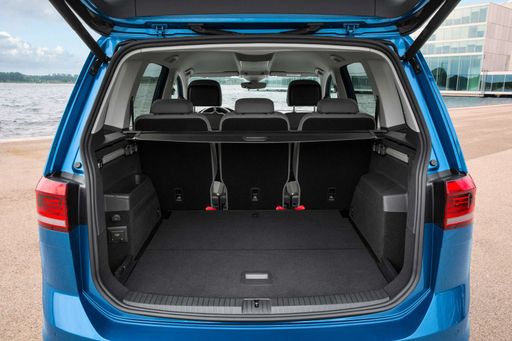 @ volkswagen-newsroom.com
@ volkswagen-newsroom.com
Toyota C-HR
The Toyota C-HR stands out with its distinctive and bold design that combines sleek, angular lines with a sporty posture. Its comfortable and stylish interior is equipped with advanced technology features, providing a seamless driving experience. The vehicle offers impressive handling and performance, making it a compelling choice for those who appreciate a blend of practicality and flair on the road.
details @ Toyota
@ Toyota
 @ Toyota
@ Toyota
 @ Toyota
@ Toyota
 @ Toyota
@ Toyota
 @ Toyota
@ Toyota

|

|
|
|
|
Costs and Consumption |
|
|---|---|
|
Price
34700 - 43900 £
|
Price
29100 - 42800 £
|
|
Consumption L/100km
5.3 - 6.6 L
|
Consumption L/100km
0.8 - 5.1 L
|
|
Consumption kWh/100km
-
|
Consumption kWh/100km
-
|
|
Electric Range
-
|
Electric Range
68 km
|
|
Battery Capacity
-
|
Battery Capacity
-
|
|
co2
140 - 150 g/km
|
co2
17 - 115 g/km
|
|
Fuel tank capacity
58 L
|
Fuel tank capacity
43 L
|
Dimensions and Body |
|
|---|---|
|
Body Type
MPV
|
Body Type
SUV
|
|
Seats
5
|
Seats
5
|
|
Doors
5
|
Doors
5
|
|
Curb weight
1520 - 1631 kg
|
Curb weight
1505 - 1755 kg
|
|
Trunk capacity
834 L
|
Trunk capacity
350 - 447 L
|
|
Length
4527 mm
|
Length
4362 mm
|
|
Width
1829 mm
|
Width
1832 mm
|
|
Height
1668 mm
|
Height
1558 - 1564 mm
|
|
Payload
590 - 601 kg
|
Payload
375 - 425 kg
|
Engine and Performance |
|
|---|---|
|
Engine Type
Petrol, Diesel
|
Engine Type
Full Hybrid, Plugin Hybrid
|
|
Transmission
Manuel, Automatic
|
Transmission
Automatic
|
|
Transmission Detail
Schaltgetriebe, Automat. Schaltgetriebe (Doppelkupplung)
|
Transmission Detail
-
|
|
Drive Type
Front-Wheel Drive
|
Drive Type
Front-Wheel Drive, All-Wheel Drive
|
|
Power HP
122 - 150 HP
|
Power HP
140 - 223 HP
|
|
Acceleration 0-100km/h
8.9 - 10.8 s
|
Acceleration 0-100km/h
7.4 - 9.9 s
|
|
Max Speed
195 - 209 km/h
|
Max Speed
175 - 180 km/h
|
|
Torque
250 - 360 Nm
|
Torque
-
|
|
Number of Cylinders
4
|
Number of Cylinders
4
|
|
Power kW
90 - 110 kW
|
Power kW
103 - 164 kW
|
|
Engine capacity
1498 - 1968 cm3
|
Engine capacity
1798 - 1987 cm3
|
General |
|
|---|---|
|
Model Year
2024
|
Model Year
2024 - 2025
|
|
CO2 Efficiency Class
E
|
CO2 Efficiency Class
C, B
|
|
Brand
VW
|
Brand
Toyota
|
VW Touran
Discovering the VW Touran: A Versatile Family Van
The VW Touran is a compelling choice in the realm of family vehicles, boasting a combination of practicality, performance, and innovative features. As a van, it offers ample space and comfort while being equipped with modern technology to ensure a superior driving experience. Let's delve into its technical aspects and noteworthy innovations.
Engine Options and Performance
The VW Touran presents an impressive array of engine choices, catering to varied preferences. It is available in both petrol and diesel variants, with power outputs ranging from 122 to 150 PS. With a turbocharged 1.5-litre petrol engine, it efficiently combines power and fuel economy. Meanwhile, the diesel version, with a 2.0-litre TDI engine, promises commendable torque and fuel efficiency of up to 5.1 L/100km.
Designed to cater to different driving preferences, the Touran comes with either a manual or automatic gearbox. The automatic versions feature a highly responsive double-clutch system, enhancing the overall driving dynamics. Whether you prefer a lively drive through urban areas or a smooth cruising on highways, the Touran delivers a balanced experience.
Technical Specifications: Space and Practicality
Embodying the attributes of a perfect family van, the VW Touran offers generous interior space with seating for five and a versatile boot capacity of 834 litres. Its impressive dimensions, with a length of 4527 mm, a width of 1829 mm, and a height of 1668 mm, provide a spacious and comfortable cabin. The vehicle's practical features include a maximum payload capacity of up to 601 kg, making it ideal for family trips or transporting bulky items.
Moreover, the Touran's 58-litre fuel tank ensures fewer stops for fuel, enhancing long-distance travel convenience. With CO2 emissions between 133 to 147 g/km, it balances performance with environmental considerations. These attributes make it an ideal choice for families seeking both functionality and eco-friendliness.
Advanced Technology and Safety Features
Safety and innovation are at the heart of the VW Touran's design. It comes equipped with a variety of driver-assistance systems, including adaptive cruise control, lane assist, and park assist, which significantly enhance driving ease and safety. The infotainment system is no less impressive, offering seamless smartphone integration, navigation, and connectivity features.
The Touran also features VW's signature post-collision braking system, which mitigates the risk of secondary collisions. Combined with a robust and stable build, these features provide peace of mind to drivers and passengers alike.
Conclusion: The Ideal Family Companion
The VW Touran stands out in the competitive van segment with its blend of practicality, efficiency, and state-of-the-art technology. Whether you're embarking on a family adventure or navigating everyday commutes, the Touran is designed to meet the demands of modern living with ease. With its range of engine options, sophisticated features, and unwavering commitment to safety, it represents a solid investment for families seeking a reliable and versatile vehicle.
Toyota C-HR
Revolutionising the Crossover Segment: The Toyota C-HR
The Toyota C-HR has firmly established itself as a standout contender in the compact crossover segment. Known for its distinct design and hybrid capabilities, the C-HR continues to prioritise innovation and efficiency. In this article, we delve into the technical details that make the 2024 iteration a compelling choice for discerning buyers.
Distinctive Design and Aerodynamics
The Toyota C-HR boasts a striking design that combines angular lines with modern aesthetics. This isn't merely for show; the design enhances aerodynamics, improving fuel efficiency and handling. With dimensions of 4362mm in length and a sophisticated structure, the C-HR strikes a balance between urban agility and on-road stability.
Impressive Hybrid Powertrains
The C-HR lineup offers innovative hybrid and plug-in hybrid drivetrain options. The full hybrid system is tailored for those who seek both economic and environmental benefits. It combines a petrol engine with an electric motor to deliver power outputs ranging from 140 to 223 PS, achieving remarkable fuel consumption rates from 0.8 to 5.1 L/100km. The 2.0 Plug-In Hybrid variant impresses with an electric range of 67 km, ideal for urban commuters.
Unmatched Efficiency and Performance
Acceleration figures for the C-HR range from 7.4 to 9.9 seconds to reach 0-100 km/h, ensuring a responsive driving experience. Maximum speeds between 175 and 180 km/h cater to those who appreciate a bit of zest on the open road. Coupled with CVT automatic transmission and both front-wheel and all-wheel-drive configurations, the C-HR adapts to various driving conditions with ease.
Advanced Technology and Features
Inside, the C-HR is equipped with the latest technology aimed at providing connectivity and comfort. The model hosts an array of features across its diverse trim levels, including Business Edition, Lounge, and the sporty GR SPORT. Each variant is designed to meet the demands of different lifestyles, ensuring there's a C-HR model to suit every taste.
Sustainability and Cost Efficiency
With CO2 emissions ranging from 19 to 115 g/km, the C-HR stands as a testament to Toyota's commitment to sustainability. Financially savvy consumers will also appreciate the running cost, with monthly expenses from €959 to €1204, and a cost per km as low as 38.4 cents. Such efficiency makes the vehicle an attractive option for eco-minded buyers.
Conclusion: A Forward-Thinking Choice
The 2024 Toyota C-HR embodies Toyota's forward-thinking approach to automotive innovation, blending eco-friendly hybrid technologies with stylish design and practicality. It offers a glimpse into the future of driving, where efficiency meets elegance. Whether you're a city dweller or an adventure seeker, the C-HR promises a driving experience that is both enjoyable and environmentally conscious.
The prices and data displayed are estimates based on German list prices and may vary by country. This information is not legally binding.
